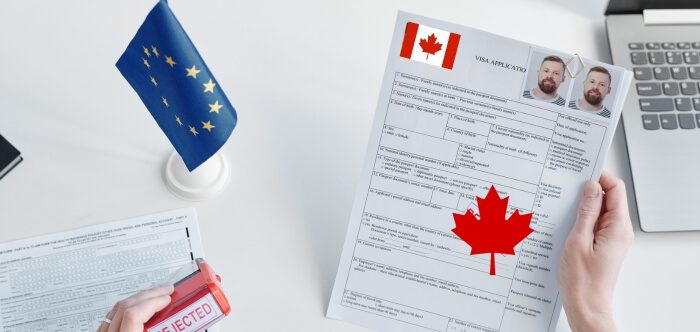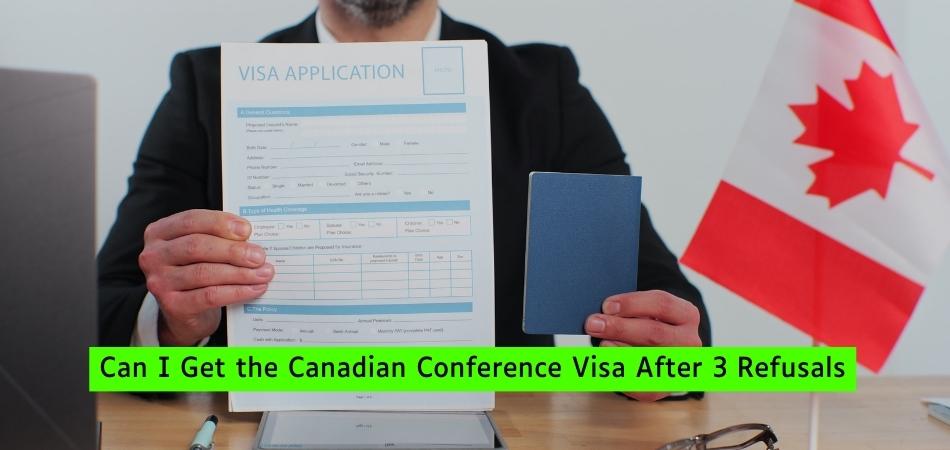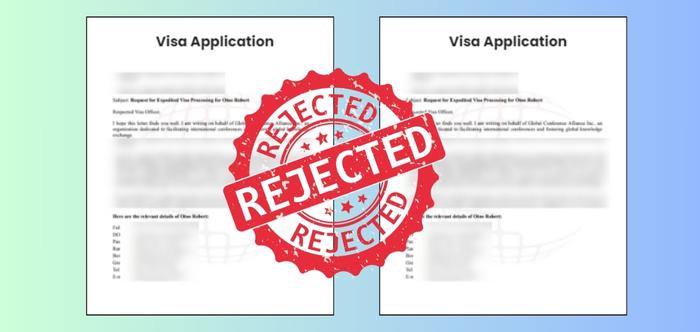Embarking on an international conference journey often begins with securing a visa, a critical step for many aspiring attendees. This brings us to a pivotal question: “Can I get the Canadian conference visa after 3 refusals?”
Yes, you can apply for a Canadian visa. Interestingly, there is no legal limit on the number of times one can apply for a Canada visitor visa, which includes conference visas. Despite previous rejections, the door remains open for future attempts.
This article aims to shed light on the intricacies of reapplying, focusing on addressing past refusals and enhancing your application. If you’ve faced hurdles in your visa journey, join us as we dive into effective strategies to turn your Canadian conference visa aspirations into a reality.
A Brief Overview of the Canadian Visa Processing System
It can be difficult to navigate the Canadian visa processing system. Understanding its structure is crucial for successful applications. This overview offers a snapshot of the system’s framework.

The Canadian visa system, managed by Immigration, Refugees and Citizenship Canada (IRCC), caters to various categories, including tourism, work, and study. Application assessment involves scrutinizing applicant details against set criteria to ensure eligibility and security. Each category has unique requirements, highlighting the system’s comprehensive and tailored approach.
Processing times vary based on visa type, applicant’s country, and application volume at embassies. Applicants must provide accurate, complete information to avoid delays. Consistent updates and improvements reflect Canada’s commitment to an efficient and fair visa process.
Can I Get the Canadian Conference Visa After 3 Refusals?
Yes, obtaining a Canadian conference visa after three refusals is possible. The law doesn’t limit the number of applications you can submit. Each new application is assessed independently.
Understanding Reasons for Previous Refusals
Careful analysis of past rejections is essential. Each refusal comes with reasons that provide valuable insights. Addressing these issues in your new application is critical. This process increases the chances of a successful outcome.
Improving Documentation
Enhance the clarity and comprehensiveness of your supporting documents. Strong documentation substantiates the purpose and duration of your visit. Ensure all required information is current and accurately presented. This shows commitment to compliance and clarity.
Demonstrating Strong Ties
Prove substantial ties to your home country, like employment or family. This reassures officials of your intent to return post-conference. Strong ties are indicators of a temporary stay in Canada. They play a crucial role in visa approval decisions.
Financial Stability
Show evidence of sufficient funds for your stay. Financial stability is a key factor in visa decisions. It ensures you can support yourself during the conference. Clear financial records and bank statements are persuasive.
Consistency in Application Details
Maintain consistency across all application details. Inconsistencies can raise red flags for visa officers. Double-check personal information, travel plans, and accommodation details. Consistent information builds trust and credibility in your application.
Seeking Professional Advice
Consider consulting a visa specialist or immigration lawyer. Professional guidance can significantly improve the quality of your application. Experts can identify weaknesses and suggest improvements. Their experience can navigate complex visa situations effectively.
Preparing for the Interview
If an interview is required, prepare thoroughly. Practice answers to potential questions about your conference and stay in Canada. Demonstrating confidence and clarity during the interview is crucial. Be honest and precise in your responses to build credibility.
In summary, while previous refusals can be disheartening, they don’t permanently hinder your chances. By understanding and addressing the factors leading to past rejections, and enhancing your application with clear, consistent, and comprehensive details, your prospects of obtaining a Canadian conference visa improve significantly.
What Can You Do After Getting Rejected 3 Times in Getting a Canadian Visa?
Experiencing three rejections for a Canadian visa can be challenging, but it’s not the end of the road. Each refusal provides valuable feedback and an opportunity for improvement. Understanding your next steps is key to turning the situation around.
Review Refusal Letters Carefully
Each refusal letter contains specific reasons for denial. Study these letters to understand the issues raised. Identifying the weaknesses in your previous applications is the first step. This helps in making necessary adjustments for future applications.
Improve Application Documentation
Enhance the quality of your supporting documents. Ensure all information is current, accurate, and thoroughly detailed. Stronger documentation can address the concerns raised in refusal letters. This includes financial statements, employment letters, and travel itineraries.
Seek Professional Guidance
Consulting with an immigration lawyer or a visa consultant can be invaluable. These professionals can provide tailored advice based on your situation. They understand the nuances of visa applications and can offer strategic guidance. Their expertise can significantly increase your chances of approval.
Reapply with a Stronger Case
When reapplying, address the issues highlighted in previous refusals. Present a stronger, well-rounded application with detailed and consistent information. Show how your circumstances have changed or been clarified since the last application. This demonstrates your commitment and understanding of the requirements.
While multiple visa rejections can be disheartening, they often serve as a learning curve. By carefully reviewing feedback, improving documentation, seeking professional advice, and reapplying with a stronger case, you enhance your chances of success. Remember, persistence and attention to detail are key in navigating the visa application process.
How Do You Re-Apply for a Canadian Visa?
Reapplying for a Canadian visa requires a methodical approach and attention to detail. It’s a process that involves careful preparation and understanding of the nuances of the application system. This guide provides a clear roadmap for navigating the reapplication process effectively.
Step-1. Review the Refusal Notice
Begin by thoroughly reviewing the refusal notice from your previous application. Identify the reasons for denial to understand what needs improvement. This critical step informs your strategy for reapplying.
Step-2. Gather New or Updated Documents
Collect all necessary documents, ensuring they are current and more comprehensive than before. This includes financial statements, employment verification, and travel itinerary. Updated documents should reflect any changes or improvements in your situation.
Step-3. Fill Out Application Forms Carefully
Complete the application forms with precision. Ensure all information is accurate and aligns with the documents you are submitting. Pay special attention to any sections that may have contributed to previous rejections.
Step-4. Write a Cover Letter
Prepare a cover letter explaining the purpose of your visit and addressing previous refusal reasons. This letter should clearly articulate the changes or additional information you are providing. It’s an opportunity to communicate directly with the visa officer.
Step-5. Pay the Application Fee
Ensure you pay the correct visa application fee. This fee is mandatory for processing your application. Keep the receipt as proof of payment.
Step-6. Submit the Application
Submit your application through the designated channel, either online or at a visa application center. Double-check that you have included all required documents and information.
Step-7. Wait for Processing
After submission, wait for the visa processing to take place. Processing times can vary depending on the type of visa and your location.
Reapplying for a Canadian visa involves carefully reviewing previous refusals, gathering updated documentation, meticulous form filling, a well-crafted cover letter, fee payment, and timely submission. Patience and attention to detail are crucial throughout this process. Remember, each application is a fresh opportunity to present your case to the Canadian immigration authorities.
Tips to Avoid Rejections While Canadian Visa Processing
Securing a Canadian visa can be a smooth process with the right approach. Knowing what to do and what to avoid is crucial. Here are some targeted tips to help minimize the risk of visa rejection.
- Complete Applications Thoroughly: Ensure every section of the visa application is filled out accurately. Incomplete or inaccurate information can lead to immediate rejection.
- Provide Strong Documentation: Submit clear, valid documents supporting your application. This includes financial statements, employment letters, and travel plans.
- Demonstrate Financial Stability: Show proof of sufficient funds for your stay in Canada. Lack of financial evidence is a common reason for visa denial.
- Clarify Travel Intentions: Clearly state the purpose of your visit, be it tourism, business, or study. Ambiguity in travel intentions can raise concerns.
- Establish Ties to Home Country: Evidence of strong ties to your home country, like a job or family, is essential. It reassures officials of your intention to return.
- Be Consistent in Information: Ensure all information across documents and forms is consistent. Discrepancies can lead to doubts about the authenticity of your application.
- Follow the Latest Guidelines: Keep updated with the latest visa application rules and requirements. Rules can change, and staying informed is key.
- Prepare for the Interview: If an interview is required, prepare thoroughly and confidently. Demonstrating preparedness and honesty in the interview is critical.
Avoiding visa rejections hinges on a detailed, honest, and well-prepared application. By following these tips, applicants can enhance their chances of a successful Canadian visa application, paving the way for a smooth and enjoyable visit to Canada.
Last Words
Wrapping up, the journey to secure a Canadian conference visa, especially after facing three refusals, hinges on a strategic and informed approach. The key lies in analyzing and rectifying the reasons behind previous rejections.
You rebuild your application on a firmer foundation by enhancing your documentation, clearly demonstrating your financial readiness, and establishing strong ties to your home country. It’s essential to keep abreast of the latest visa guidelines and prepare diligently for interviews.
This holistic approach to reapplication addresses the crucial question, “Can I get the Canadian conference visa after 3 refusals?” with a resounding possibility. Success in this endeavor requires persistence, detailed preparation, and a clear understanding of the visa process, transforming past challenges into a learning opportunity for a stronger application.







